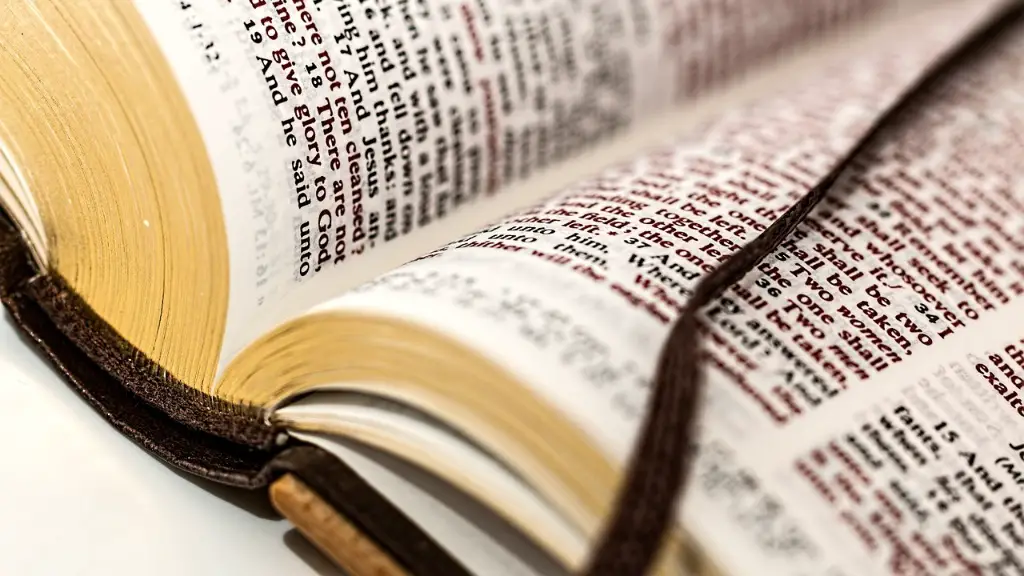The Bible speaks about issues around gay relationships, but the meanings of its passages are often misunderstood or misrepresented. The Bible is seen by many as the “Word of God,” and is the oldest book in the world, having been written by multiple authors over thousands of years. So, it is important to understand what it actually says about homosexuality, in order to make informed decisions.
The Bible references homosexuality several times. In Leviticus 18:22 and 20:13, it is forbidden for two men to lay together, so the “sin of Sodom” is associated with the “abomination” of homosexuality. In the New Testament, homosexuality was also considered an act of grave transgression, comparable to idolatry, adultery and other sins. Romans 1:26–27 states that men burned in their desire for one another, and Paul described homosexuality in 1 Corinthians 6:9 as one of the many “acts of impurity” that keep one from entering the kingdom of heaven.
However, the Bible doesn’t only condemn homosexuality. Jesus said on numerous occasions that the greatest commandments are to love one another as ourselves. The book of Matthew states that as Christians, we should judge not, lest we be judged by God. Furthermore, Jesus tells us that the only sin we can commit against God is believing in something other than what He believes. So, it can be argued that it is wrong to equate homosexuality to a sin against God.
Beyond what the Bible tells us about homosexuality, many Christian experts interpret the biblical passages differently. Dr. Justin Lee, Executive Director of The Gay Christian Network, a support network for LGBTQ+ Christians, believes that the Bible calls homosexuality sinful in some contexts, and that it also calls for love, inclusion and justice for LGBT people. He argues that despite what some people interpret as a strict condemnation of same-sex relationships, the Bible actually gives us valuable guidance on how to handle the issue.
Gays and lesbians have also sought to find spiritual solace within the framework of their own religious beliefs, such as by working alongside progressive churches or denominations. For example, many United Church of Christ (UCC) congregations celebrate same-sex marriages and offer pastoral care to gay and lesbian couples. The UCC’s official policy is to “strive for full inclusion of all persons, regardless of perceived sexual orientation or gender identity”, in addition to advocating for “equal civil rights and social justice for all persons, regardless of perceived sexual orientation or gender identity”.
The Bible’s references to homosexuality have been used to divide people into camps: one of those who believe it is a sin and the other who believe it is not. However, for many LGBT Christians, this debate is more about understanding one another than condemning one another. Christians who believe in the power of love and empathy accept gays and lesbians for who they are without adhering to strict biblical interpretations that don’t accurately reflect the teachings of Jesus.
Understanding Biblical Views On Homosexuality
Although the Bible has divided opinions on the matter of homosexuality, the overall message of the scriptures is to love one another and accept everyone’s different beliefs, opinions, and orientations. Every Christian needs to take a look at the Bible and him or herself to understand the different views. It is essential to read scripture with an open mind and heart, searching for the underlying meaning. Different folks can interpret the same passage differently. It is important to cautiously apply spiritual implications to any issue.
Comparing Gay Christianity To Traditional Christianity
The idea of “Gay Christianity” first appeared in the late 1970s. It is a form of Christian practice that is based on inclusiveness rather than exclusion. The goal is to create an open environment for Christian LGBT individuals to express and discuss their faith without suffering from discrimination or judgement. The belief system does not remain static, but is constantly evolving and changing, depending on the direction of society and the voice of its practitioners.
Unlike traditional Christianity, Gay Christianity does not consider homosexuality as a sin: instead, it seeks to nurture and include LGBT people from a loving and accepting Christian perspective. Gay Christianity has been embraced by many LGBT clergy in recent decades, such as United Church of Christ, the Anglican Church in North America, the Metropolitan Community Churches, and the Evangelical Lutheran Church in America (ELCA).
Responding To LGBT Issues From A Biblical Perspective
The Bible is a sacred document and its teachings cannot be taken lightly. Scripture can provide guidance and wisdom on LGBT issues, but it’s essential to recapture its original intent. While reading through the Bible, Christians can remember its core messages of justice, mercy and love. The Bible instructs us to accept and serve everyone, regardless of race, gender, orientation or any other defining attribute.
One of the ways the church has responded to LGBT issues from a biblical perspective is by offering pastoral services to gay and lesbian people. This is part of the Christian mandate to love one another and support each other’s spiritual journeys. The church has embraced the call to minister to the LGBT community in some capacity, from offering counseling, support groups, healing services to actively advocating for equal rights.
LGBT-Friendly Ministries In Churches
In recent years, there has been an increase in churches and ministries offering LGBT-friendly ministries and services. Many congregations have implemented annual Pride celebrations or services to create a safe and inclusive environment for those who identify as LGBTQ+. Some churches have created LGBT-150 initiatives to provide resources and education on the spiritual and cultural diversity of LGBT people and ally relationships.
LGBT-friendly ministries also provide support services, such as pastoral counseling, HIV and AIDS ministries, homeless outreach projects and spiritual retreats for those who identify as LGBT. These efforts are part of a larger movement toward inclusion and acceptance within the larger Christian community.
Conclusion
Coming to a conclusion on the matter of homosexuality and what the Bible says about it is not easy. The Bible is complex and many people can draw different conclusions. What is important is that we listen to one another and respect each other’s beliefs and opinions. The Bible may not be the best source of information on this issue, but it is nonetheless an important part of the conversation. In the end, everyone needs to decide for themselves what they believe.



